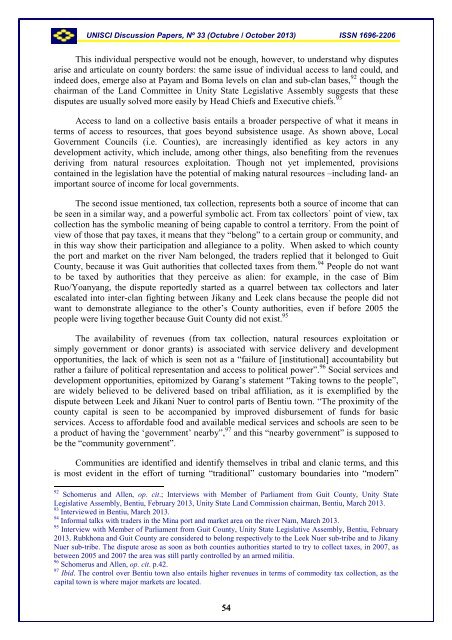UNISCI - Universidad Complutense de Madrid
UNISCI - Universidad Complutense de Madrid
UNISCI - Universidad Complutense de Madrid
You also want an ePaper? Increase the reach of your titles
YUMPU automatically turns print PDFs into web optimized ePapers that Google loves.
<strong>UNISCI</strong> Discussion Papers, Nº 33 (Octubre / October 2013) ISSN 1696-2206This individual perspective would not be enough, however, to un<strong>de</strong>rstand why disputesarise and articulate on county bor<strong>de</strong>rs: the same issue of individual access to land could, andin<strong>de</strong>ed does, emerge also at Payam and Boma levels on clan and sub-clan bases, 92 though thechairman of the Land Committee in Unity State Legislative Assembly suggests that thesedisputes are usually solved more easily by Head Chiefs and Executive chiefs. 93Access to land on a collective basis entails a broa<strong>de</strong>r perspective of what it means interms of access to resources, that goes beyond subsistence usage. As shown above, LocalGovernment Councils (i.e. Counties), are increasingly i<strong>de</strong>ntified as key actors in any<strong>de</strong>velopment activity, which inclu<strong>de</strong>, among other things, also benefiting from the revenues<strong>de</strong>riving from natural resources exploitation. Though not yet implemented, provisionscontained in the legislation have the potential of making natural resources –including land- animportant source of income for local governments.The second issue mentioned, tax collection, represents both a source of income that canbe seen in a similar way, and a powerful symbolic act. From tax collectors´ point of view, taxcollection has the symbolic meaning of being capable to control a territory. From the point ofview of those that pay taxes, it means that they “belong” to a certain group or community, andin this way show their participation and allegiance to a polity. When asked to which countythe port and market on the river Nam belonged, the tra<strong>de</strong>rs replied that it belonged to GuitCounty, because it was Guit authorities that collected taxes from them. 94 People do not wantto be taxed by authorities that they perceive as alien: for example, in the case of BimRuo/Yoanyang, the dispute reportedly started as a quarrel between tax collectors and laterescalated into inter-clan fighting between Jikany and Leek clans because the people did notwant to <strong>de</strong>monstrate allegiance to the other’s County authorities, even if before 2005 thepeople were living together because Guit County did not exist. 95The availability of revenues (from tax collection, natural resources exploitation orsimply government or donor grants) is associated with service <strong>de</strong>livery and <strong>de</strong>velopmentopportunities, the lack of which is seen not as a “failure of [institutional] accountability butrather a failure of political representation and access to political power”. 96 Social services and<strong>de</strong>velopment opportunities, epitomized by Garang’s statement “Taking towns to the people”,are wi<strong>de</strong>ly believed to be <strong>de</strong>livered based on tribal affiliation, as it is exemplified by thedispute between Leek and Jikani Nuer to control parts of Bentiu town. “The proximity of thecounty capital is seen to be accompanied by improved disbursement of funds for basicservices. Access to affordable food and available medical services and schools are seen to bea product of having the ‘government’ nearby”, 97 and this “nearby government” is supposed tobe the “community government”.Communities are i<strong>de</strong>ntified and i<strong>de</strong>ntify themselves in tribal and clanic terms, and thisis most evi<strong>de</strong>nt in the effort of turning “traditional” customary boundaries into “mo<strong>de</strong>rn”92 Schomerus and Allen, op. cit.; Interviews with Member of Parliament from Guit County, Unity StateLegislative Assembly, Bentiu, February 2013, Unity State Land Commission chairman, Bentiu, March 2013.93 Interviewed in Bentiu, March 2013.94 Informal talks with tra<strong>de</strong>rs in the Mina port and market area on the river Nam, March 2013.95 Interview with Member of Parliament from Guit County, Unity State Legislative Assembly, Bentiu, February2013. Rubkhona and Guit County are consi<strong>de</strong>red to belong respectively to the Leek Nuer sub-tribe and to JikanyNuer sub-tribe. The dispute arose as soon as both counties authorities started to try to collect taxes, in 2007, asbetween 2005 and 2007 the area was still partly controlled by an armed militia.96 Schomerus and Allen, op. cit. p.42.97 Ibid. The control over Bentiu town also entails higher revenues in terms of commodity tax collection, as thecapital town is where major markets are located.54
















